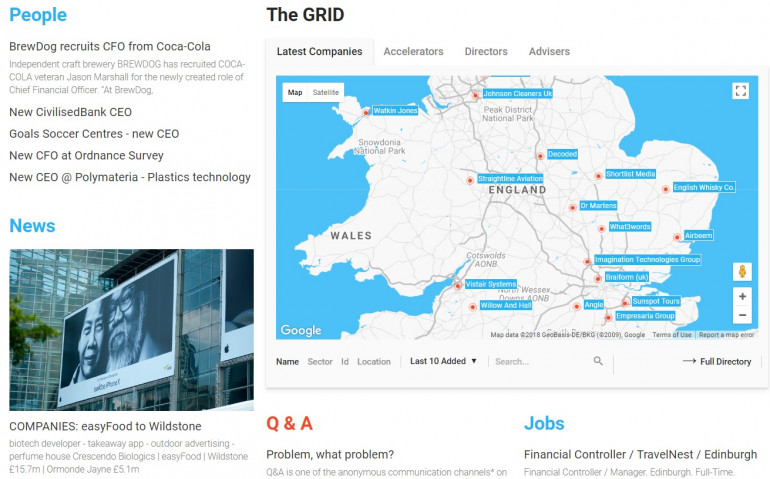Published by Directorzone Markets Ltd on November 16, 2015, 9:00 am in Knowledge, Market Info
Wednesday January 1st 2020
News about UK growth companies and accelerators - Universities, Angels, VCs, funds, hubs, incubators, councils and corporates - in the GRID marketplace 15th November 2015, from The Sunday Times start-up list / “The start-up cities. We take 25 cities and test-drive their entrepreneurial credentials”
* Profiles of: SendMyBag.com | Doowapp | Pink Boutique £10m | Rainbird
BELFAST
Qubis, Queen’s University, helps academics to commercialise intellectual property with the help of business angels and VC funds.
Kainos, the AIM-listed software developer, began as a venture between the university Queen’s University and Fujitsu.
* SENDMYBAG.COM
DZ profile: Sendmybag (NI) Limited
Business: affordable door-to-door luggage delivery service for students, expats, sportspeople and celebrities that avoids airline charges. Collect from 40 different countries and in the past 12 months handled more than 150,000 cases.
Launched: 2012
Location: Bangor, near Belfast.
Founder: Adam Ewart, 30.
BIRMINGHAM
Finance Birmingham, set up after the financial crash, manages £90m of funds for SMEs. It offers grants between £100,000 and £1m and claims to have helped 35 companies create 1,200 jobs in less than 12 months.
Birmingham University recently opened a £6.8m biomedical hub for start-ups working in medical technology and aims to help create 600 jobs in the sector.
BRIGHTON
Sussex Innovation Centre is an incubator based at the University of Sussex, just outside Brighton and houses up to 50 companies (about 300 people) at any one time. Entrepreneurs do not need to be linked to the university to apply for support, which includes help with finding customers.
BRISTOL
Bristol has always enjoyed a reputation for electronics, which earned it the nickname Silicon Gorge.
Bristol also boasts a strong creative and media contingent, the best known members being Wallace and Gromit, created by Aardman Animations. Paintworks, as “Bristol’s creative quarter”, offers working spaces and units and is home to many architects, communications and digital agencies.
SETSquared, an alliance of Bristol, Exeter, Southampton and Surrey universities has already been crowned best university incubator in Europe three years running.
Bristol excels in food and beverages with Yeo Valley and Thatcher’s Cider outside the city making national waves and with Pieminister, Loungers and Friska all expanding across the country.
CAMBRIDGE
Cambridge Enterprise (CE), the commercialisation arm of the university, works to support business creation through a £15m fund, which is used to invest in companies based directly on university research or people.
Follow-on investment, to support high-growth technology companies, is available through Cambridge Innovation Capital, which was established to help emerging spin-outs and start-ups survive the perilous middle stage of commercial development.
The Babraham Research Campus is considered Britain’s top campus for support for early-stage bioscience ventures. The campus bioincubator offers bespoke research and development facilities for companies at any stage.
The area has an experienced group of wealthy individuals in Cambridge Angels, a consortium that backs young companies with cheques between £50,000 and £1m. Successful entrepreneurs such as the Autonomy founder Mike Lynch and the high-profile investor Sherry Coutu have put money into technology start-ups through the group.
CARDIFF
Cardiff council’s strategy is to provide incubator space for start-ups in more deprived outer areas, getting urban regeneration in return for its help. It also offers space for new businesses to try their hand at bricks-and-mortar retailing in low-rent temporary shops set up in disused city centre premises.
Cardiff Start is a network of founders and investors that was set up by entrepreneurs including Neil Cocker of Dizzyjam.com, the music merchandise creation business, and Stephen Milburn, who set up Tradebox Media, an app development firm, in Cardiff Bay.
Funding streams available to SMEs across Wales, include the £157m Wales Joint European Resources for Micro to Medium Enterprises fund and the £40m Wales SME Investment Fund as well as number of sector-specific options. They can also get up to £3,000 towards the capital costs of installing high-speed broadband.
COVENTRY
Just over 11% of Coventry SMEs are in digital and high tech industries
EDINBURGH
Jamie Coleman has 62 companies under his wing at CodeBase and he wants to help them become billion-dollar companies.
Edinburgh tech scene success stories: Fanduel - sport fans’ site; Skyscanner - travel comparison site.
Last year Edinburgh University launched three spinouts and 41 start-ups, which attracted £237m of investments.
According to Jonathan Harris of newsletter Young Company Finance, several companies are attracting interest: Nucana Biomed, an anti-cancer drug developer;
Celtic Renewables, a producer of bio-fuels from whisky waste;
Shot Scope Technologies, which makes wearable tech for golfers.
Outside technology:
Flavourly - artisan food delivery company and
Mallzee - mobile shopping app
…both turned down backing from Dragons’ Den but profited greatly from the marketing.
GLASGOW
Sir Tom Hunter has played a key role in supporting Entrepreneurial Spark and with the not-for-profit Saltire Foundation, which places executives with companies around the world. The foundation was brought into being by GlobalScot, a network of expat Scottish business leaders.
Glasgow is also home to Scottish Equity Partners, a venture capital firm which wisely took a small stake in Gareth Williams’s Skyscanner comparison website in the early days.
M Squared, the next-generation laser developer, led by Graeme Malcolm, is often highlighted as a company to watch.
GUILDFORD
The University of Surrey 100 Club of angel investors has helped companies to raise more than £30m since it was founded in 2007; nearly 95% of companies selected to pitch to it have secured funding or other ongoing business support.
Video game start-ups wanting to get their idea off the drawing board and into production might be able to access a grant of up to £25,000 from the government’s Video Games Prototype Fund; a report published last year claimed that Guildford is one of the country’s 12 big hubs for the industry.
LEEDS
Cocoon, the home security provider, is a stand-out local tech company.
With three universities, one in seven people are students.
Duke Studios set up in 2011, houses 56 businesses turning over just under £2m.
LEICESTER
There are already more than 200 SMEs working across the four incubation facilities owned and operated by the council:
- LCB Depot, Phoenix Square and Makers’ Yard three dedicated creative sector workspaces.
- Dock Startup Lounge, close to the National Space Centre, for low carbon and/or hi-tech companies.
The Leicester and Leicestershire Enterprise Partnership facilitates:
- the Sir Thomas White Loan Charity, with nine-year interest-free loans of up to £15,000 for eligible 18-35 year olds;
- the Harry James Riddleston Charity, which can lend up to £10,000 interest free to eligible entrepreneurs;
- the European Structural and Investment Fund, which will bring £111m to help 1,000 new businesses start;
- the Textile Growth Programme, which offers grants of up to £1m for capital projects that create or safeguard jobs.
LIVERPOOL
Incubation space at Liverpool Science Park, Baltic Creative, Anfield Business Centre and Liverpool John Moores University’s Centre for Entrepreneurship.
LONDON
London is home to the most thriving start-up hub in the country with 184,671 new companies registered in 2014, up 32,587 on 2013.
Significant increase over four years in the number of start-up programmes backed by large corporations for promising young ventures in the city:
- Microsoft Ventures
- Wayra (O2 Telefonica)
- the Barclays Accelerator (Techstars)
- JLab (John Lewis)
- Red Bull Amplifier
- Distill Ventures (Diageo)
- BBC Worldwide Labs.
Research suggests there are more than 30 accelerator programmes in Britain, and over 20 are in the capital - with Seedcamp among the industry’s top programmes. Accelerator programmes tend to take equity from start-ups in return for their support and funds while incubators are mainly hubs of free support.
Recently, Virgin Media Business announced its new accelerator programme, which offers start-ups three months of support and up to £78,000 in funding for 10% of equity.
Entrepreneur First’s “pre-acceleration” model means applicants are individuals rather than companies and benefit from 12 months of building skills and developing an idea while winning investment.
The capital has also seen a rise in sector-specific incubators and accelerators.
Level39 in Canary Wharf is Europe’s largest technology accelerator firm working in financial technology, cybersecurity and retail.
Front Row, an accelerator for fashion ventures
Emerge Education covers start-ups working in education
Kitchenette focuses on food companies.
The Young Foundation specialises in social projects
Healthbox focuses on healthcare companies.
Cyber London (CyLon), Europe’s first accelerator for start-ups working in the intelligence sector.
The city’s drive to become the centre of technology start-ups in Europe has driven giants such as Facebook, Google and Cisco to open offices in the capital. Last year, Google Ventures chose London to house its European investment arm.
* DOOWAPP
DZ profile: Doowapp Limited
Business: lets users attach music clips to messages.
Founders: Yaw Asamani, 33 - who came to Britain a decade ago from Botswana, where he was born - with his brother George and cousin George Asampong.
MANCHESTER
According to TechNation, there was a 70% growth in tech companies in Greater Manchester between 2010 and 2013.
Accelerator and working spaces for start-ups:
The Escalator in Deansgate - a joint venture between Barclays and Central Working, which also houses the Barclays Accelerator in London.
Forward, a redevelopment of an existing building, where coding will be taught to young and old alike. In the last Budget George Osborne announced £4m for this project. It is the brainchild of Doug Ward and Shaun Gibson, who have already raised £20m for the project.
Northern Quarter a creative hotbed anchored by companies such as Boohoo.com.
Out of the centre, the Sharp Project leads the way in creative and digital working spaces
Media City in Salford also attracts creative types.
MIDDLESBOROUGH
Manufacturing and service sector businesses may be able to access £50,000 to £1m through the Let’s Grow scheme, which covers the whole of the northeast.
DigitalCity Business is driving the growth of digital businesses in Middlesbrough and the Tees Valley through its cluster of offices as well as training, investment and networking for start-ups.
A recent report from the Centre for Cities think tank found that 29% of Middlesbrough’s SMEs were in professional services – the second-highest proportion in the country.
MILTON KEYNES
Milton Keynes’s location puts it in easy reach of London, Cambridge and Oxford but office space is cheaper, which goes some way to explain why it is second only to the capital in the number of SMEs that set up in 2013 – 1,730 – relative to its population.
A quarter of Milton Keynes’ s SMEs are in professional services, while 18% of them are in the hi-tech and digital sector; the council is planning to expand this next year with the creation of a tech hub. There is also a strong creative sector, supported by Arts Gateway MK.
NEWCASTLE
* PINK BOUTIQUE
DZ profile: Pink Boutique Limited
Business: online fashion retailer.
Location: Newcastle upon Tyne.
Founder: Alice Hall, 27. Last month Hall, was named emerging entrepreneur of the year at the UK Private Business Awards.
Financials: expected to turnover £10m this year. She hasn’t borrowed a penny.
Staff: 50 people.
NORWICH
The creative, digital and ICT sectors are big in Norwich, with this year’s Tech Nation report identifying a 21% increase in the number of digital companies incorporated in Norfolk between 2010 and 2013.
Norwich University of the Arts is a hotbed for gaming entrepreneurs, while artificial intelligence start-ups are also attracting attention, e.g.
* RAINBIRD:
DZ profile: Rainbird Technologies Ltd
Business: artificial intelligence
Launched: 2013
Location: Norwich Research Park
Investment: Raised more than £1m in funding from a mixture of angel investors and funds such as New Anglia Capital, which is run by New Anglia Local Enterprise Partnership (LEP) and Anglia Capital Group.
Norwich Research Park is set up to house businesses working in science and technology, with support in its Innovation Centre – designed for SMEs with 10 or fewer staff.
New Anglia LEP’s focus is on SMEs that have potential to grow fast and create “high value” jobs, through initiatives such as
- the Growing Business fund, which offers grants between £5,000 and £500,000;
the growth hub, which is designed as a one-stop shop for entrepreneurs looking for advice;
and the New Anglia Capital co-investment fund, to which entrepreneurs and businesses can pitch for 50% of the risk capital needed to launch a new product or idea. The fund was launched with £1m funding from the LEP.
NOTTINGHAM
Biocity Nottingham is home to some 70 companies and is growing fast on the site of former research laboratories belonging to Boots the chemist. Chief executive Glenn Crocker.
Nottingham council is backing a £30m scheme to create a bioscience facility next door to BioCity, which will allow more established ventures to expand. While Boots still maintains a presence, credit-checker Experian, energy company Eon and the two universities, Nottingham and Nottingham Trent, are the big employers.
One of the city’s leading entrepreneurs, Mark Onyett, who launched a tech firm, TDX, later sold for £200m, is now building Bizfitech, a comparison website for small-business lending.
OXFORD
Oxford science park, a joint venture between Magdalen College and Prudential, provides companies with flexible office space and laboratories through its innovation centre.
The Isis start-up incubator since opening in 2011 has housed more than 40 ventures and claims to have helped them raise in excess of £10m. Alongside it runs the Isis Angels Network, a consortium that invests in university spin-outs.
The new Science Vale UK enterprise zone at Harwell Oxford and Milton Park focuses on expanding science and technology businesses.
Oxford Early Investments is a consortium that backs young companies across all sectors with between £25,000 and £250,000.
The Oxford Investment Opportunity Network invests between £200,000 and £2m at a later stage in their cycle.
READING
Reading has the UK’s highest proportion of SMEs in the hi-tech and digital sector, with such businesses making just over a fifth of the total. The emphasis on tech start-ups is heavily influenced by the number of big IT corporations in the city, including Microsoft, Oracle and Verizon.
More than half of SMEs are in the digital, creative and professional services sectors. It came second to Warrington for proportion of high-growth businesses between 2011 and 2014, and its density of SMEs – 373 for every 10,000 people – is only beaten by London.
PLYMOUTH
Plymouth science park, which is backed by both council and Plymouth University, houses everything from one-person start-ups to key multinationals, with its tenants generating a combined turnover of £100m. It supports knowledge-based businesses in tech and creative sectors including engineering, renewable energy and healthcare.
SHEFFIELD
Sheffield’s history was forged by the steel industry. Today a few miles outside the city the university’s Advanced Manufacturing Research Centre is also beginning to spawn start-ups such as Gareth Morgan’s Advance Manufacturing Company which offers high-performance precision machining.
SOUTHAMPTON
Southampton has a relatively high proportion of “knowledge intensive” businesses – 17% – as well as Europe’s most productive port and thriving aerospace, marine and environmental technology sectors.
For instance, grants of £5,000 to £75,000 are available to SMEs and start-ups across the Solent area through the £1.85m third phase of the Bridging the Gap fund, with priority going to those creating or safeguarding jobs. “Green” entrepreneurs and SMEs can seek assistance from the £3m Green Growth fund.








